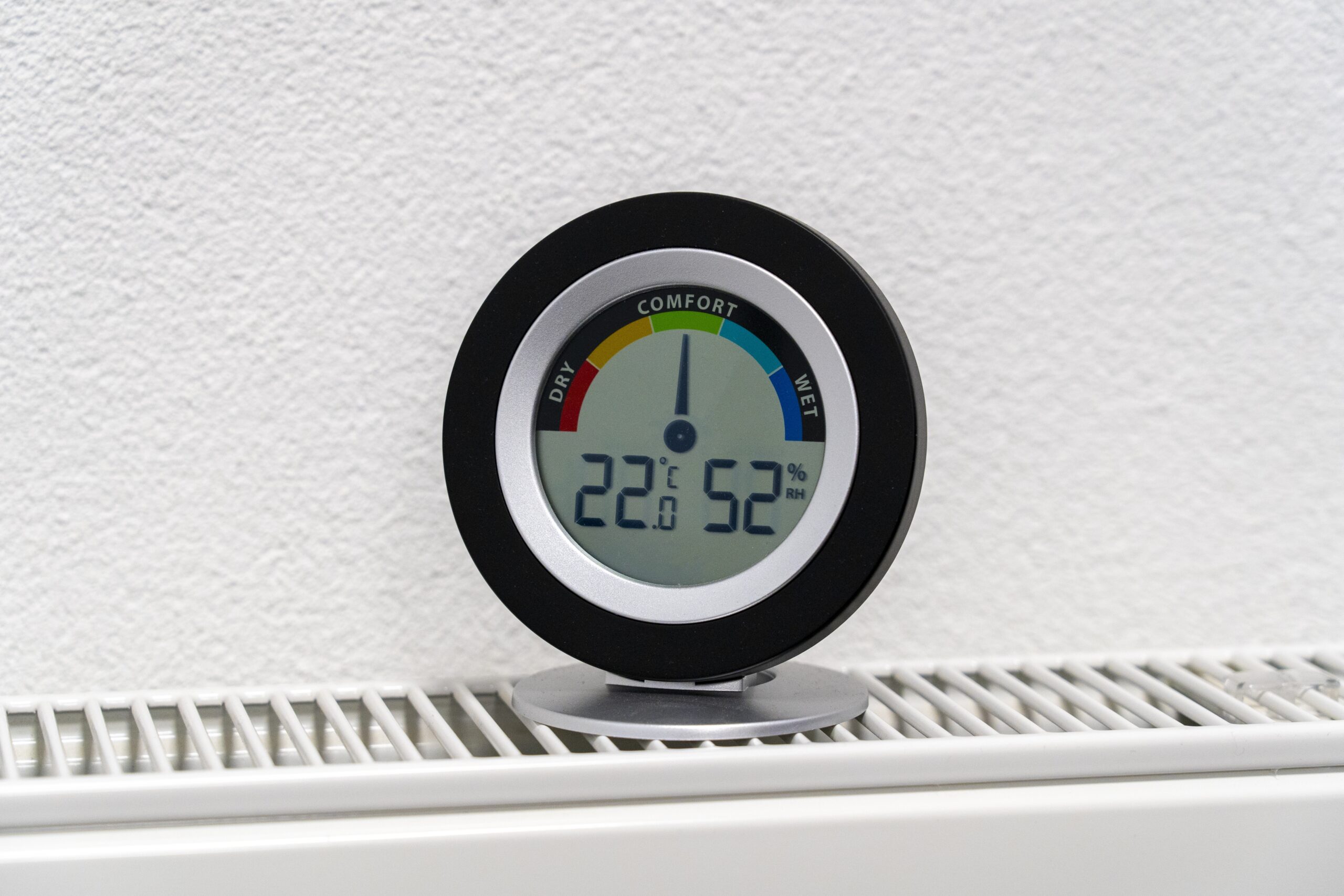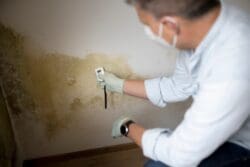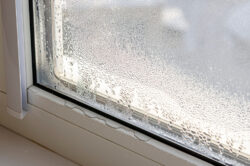
High humidity can be a sticky challenge for homeowners in Florida. With the state’s coastal location and subtropical climate, it’s not uncommon for outdoor humidity levels to reach 75% or even 90% at certain times of the year. With humidity levels this high outside the home, it’s not surprising that the air inside your home can be affected as well, with unbearable, moisture-rich indoor air quality creating uncomfortable living conditions in what should be a sanctuary from the heat. For this reason, proper humidity control is crucial for home comfort and health in Florida — and it’s achievable with proper HVAC maintenance.
In this article, we’ll define humidity and review how it impacts the comfort and health of homeowners in Florida, outlining steps you can take to measure humidity levels and achieve ideal indoor humidity. In addition to providing suggestions you can use to lower indoor humidity levels, we’ll also instruct you on how to maintain an ideal indoor humidity and sustain maximum comfort in your home year-round.
Understanding Humidity Levels in Florida Homes
What Is Relative Humidity and Why Does It Matter?
Humidity is a measure of how much moisture is present in the air, usually expressed as relative humidity (RH). Relative humidity looks at the amount of moisture the air is holding compared to the maximum it could hold at a given temperature. So an RH of 74.5% — the average for Florida — means the air is holding 74.5% of the total moisture it could contain.
The Impact of Florida’s Climate on Indoor Humidity
High humidity can make Florida’s heat feel even more intense, as sweat has a harder time evaporating from the skin. It also creates an environment ripe for mold, mildew, and other moisture-related issues in the home.
So, what is the ideal indoor humidity in Florida? Generally speaking, the goal should be to maintain RH between 45-55%. This range provides comfort, good indoor air quality, and protection against moisture problems, while also being energy-efficient to achieve.
Reaching and maintaining this ideal humidity level can be a challenge given Florida’s naturally humid climate. In the next section, we’ll discuss why it’s so important to fight this challenge and how maintaining ideal indoor humidity in Florida can benefit not only your health but the health of your home as well.
Why Maintaining the Right Humidity Is Important for Florida Homes
Health and Comfort Benefits
Because high humidity levels can impact both comfort and health, keeping indoor humidity within the optimal range of 45-55% is crucial in Florida to prevent issues like allergies and compromised respiratory health. When the temperature rises above 80°F, anything over 40% RH can start to feel uncomfortable. At 88°F with 75% humidity, the “heat index” enters the dangerous zone, putting people at risk of heat-related illnesses like heat stroke, heat cramps, or heat exhaustion — especially when combined with prolonged exposure or physical activity.
The high heat and humidity combination common in Florida makes it challenging for the body to cool itself effectively through sweating. The moisture in the air prevents evaporation, trapping heat and making you feel hot, sticky, and fatigued. This can be especially problematic for the elderly, young children, or those with certain medical conditions.
Protecting Your Home from Damage
Excessive indoor humidity levels can also contribute to property damage over time, fostering the perfect environment for mold and mildew growth. These microscopic fungi can take hold on a variety of surfaces, causing discoloration, odors, and even structural damage in the form of wood rot over time. Susceptible items include soft furnishings, books, carpets, drywall, wooden products, and electronics.
Insects like dust mites and cockroaches also thrive in warm, moist conditions, making pest infestation another concern for your home when it can’t maintain ideal indoor humidity levels. Not to mention, high humidity further strains your HVAC system, causing it to work overtime to remove excess moisture from the air. This can lead to higher energy usage and expensive utility bills.

How to Measure and Monitor Humidity Levels in Your Home
Using a Hygrometer
Given Florida’s naturally humid climate, homeowners must be proactive about monitoring and managing indoor humidity levels. Hygrometers, or humidity sensors, can be purchased at most local hardware stores and offer precise RH measurements, while indoor air quality monitors can be provided and installed by HVAC professionals to provide even more comprehensive indoor air quality insights.
Signs of High or Low Humidity Without a Hygrometer
Even without the aid of advanced diagnostic instruments, you may notice indicators from your home that it’s struggling to maintain ideal indoor humidity levels. You may start to notice condensation on your windows, musty odors, or dry skin. If you detect any of these warning signs, it may be time to contact an HVAC professional for help.
What Causes High Indoor Humidity in Florida?
Poor Ventilation
As we’ve already identified, the primary contributor to high indoor humidity in Florida homes is the state’s subtropical climate. However, homeowners can also inadvertently contribute to the problem through inadequate ventilation in areas like bathrooms, kitchens, and laundry rooms where moisture is excessively produced and easily trapped. Blocked or obstructed air vents in these living spaces prevent proper air circulation, and can be remedied with the installation of exhaust fans to vent out humid air.
Inefficient Air Conditioning Systems
Your home’s air conditioning system plays a critical role in controlling indoor humidity. Besides cooling the air, a properly functioning AC unit will also remove excess moisture, naturally dehumidifying the space. However, issues with the AC system can undermine this. For example, an improperly sized unit may short-cycle or a dirty evaporator coil might diminish your system’s overall moisture removal efficiency. Without regular maintenance, problems like these can allow indoor humidity to creep up.
In general, a well-maintained central air conditioning system should be able to keep indoor relative humidity in the comfortable 40-60% range, even in Florida’s subtropical climate. In the next section, we’ll explore some strategies homeowners can use to manage indoor humidity to create a healthier, more comfortable living environment.

Effective Strategies to Lower Indoor Humidity
Regular AC Maintenance
Your home’s air conditioning system plays a critical role in dehumidifying the air. By extracting warm, humid air, cooling it, and forcing the drier air back into the living space, a well-tuned AC system can help maintain ideal indoor humidity levels.
However, neglecting AC maintenance can impair its ability to work properly. Issues like a dirty evaporator coil or improperly sized equipment can prevent the system from effectively removing excess moisture. Scheduling biannual tune-ups with an HVAC professional — and ensuring all vents remain unobstructed — will help your AC perform at its best.
Installing Dehumidifiers
For homes where the AC system alone struggles to keep up with humidity, a standalone dehumidifier can provide essential, supplemental moisture removal. These appliances are specifically designed to extract excess water vapor from the air, lowering the overall indoor RH.
Dehumidifiers can be freestanding units placed in problem areas, or they can be integrated directly into your HVAC system. An HVAC technician can assess your home’s setup and recommend the right dehumidification solution for the job.
Improving Home Ventilation
Proper airflow and ventilation are also key to controlling indoor humidity. Bathrooms, kitchens, and laundry rooms are especially prone to moisture buildup, so make sure these spaces have adequate exhaust fans to vent out humid air.
Additionally, avoid air-drying clothes indoors, as this can contribute to high humidity. Use your clothes dryer instead, venting the moist air outside the home.
Is Low Humidity Ever a Problem in Florida?
Effects of Low Humidity
RH below 30% is considered low in Florida, but it is rarely an issue. In these uncommon circumstances, the unusually dry air can lead to dry skin, respiratory discomfort, and static electricity. If you notice any of these issues, you might consider installing a humidifier in your home to introduce moisture to the excessively dry air.
Should You Use a Humidifier in Florida?
When Humidifiers Are Useful
During unusually dry spells — or in overly air-conditioned spaces — humidifiers can prove useful in balancing RH from the opposite direction to achieve ideal indoor humidity levels. You might also consider installing a humidistat, a device that senses RH and automatically turns your humidifier on and off when RH levels fall outside of ideal ranges.
Maintaining Ideal Humidity Levels Year-Round
Seasonal HVAC Tune-Ups
By scheduling regular HVAC check-ups, Florida homeowners can take a proactive step toward indoor humidity control and comfort. At Gulf Shore Cooling, we offer maintenance memberships to provide Southwest Florida homeowners with routine servicing of their HVAC systems in this particularly humid region.
Some of the advantages of becoming a Maintenance Member include:
- Fewer repairs
- Cost of inflation protection
- No overtime charges
- Lower utility bills
- Cleaner air quality
- Improved home comfort
As a Mitsubishi Diamond Dealer and Lennox Premier Dealer, Gulf Shore Cooling combines high-quality products with unparalleled expertise. Our A+ rating from the Better Business Bureau means we’re dedicated to customer satisfaction and comfort when you need ideal indoor humidity in Florida.
In addition to humidity control, Gulf Shore Cooling offers comprehensive heating, air conditioning, and HVAC repair services to ensure your home stays comfortable year-round. Whether you need routine maintenance, system repairs, or new installations, our team is ready to help you maintain a comfortable indoor environment, no matter the season. Call us today at (239) 232-6653 and experience our expert HVAC care.



